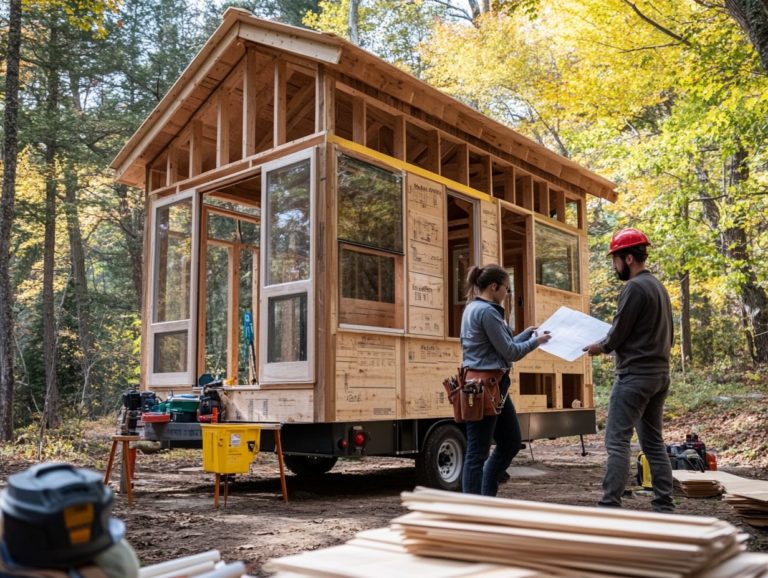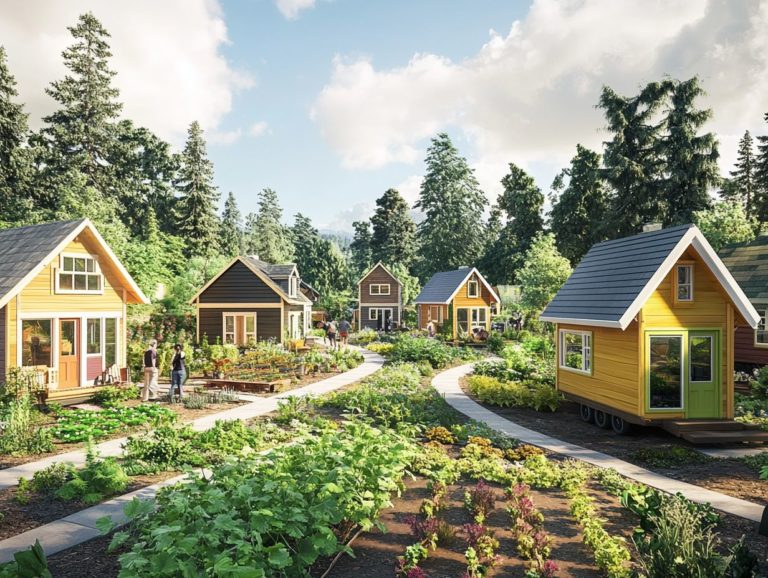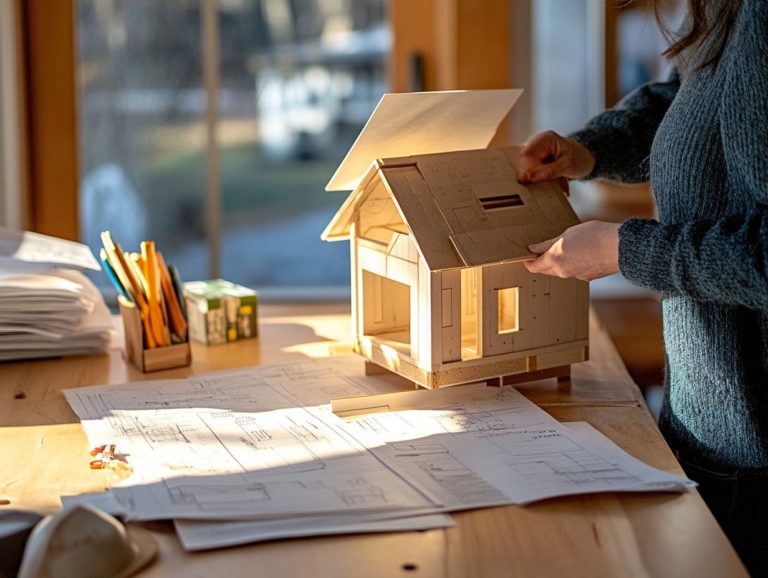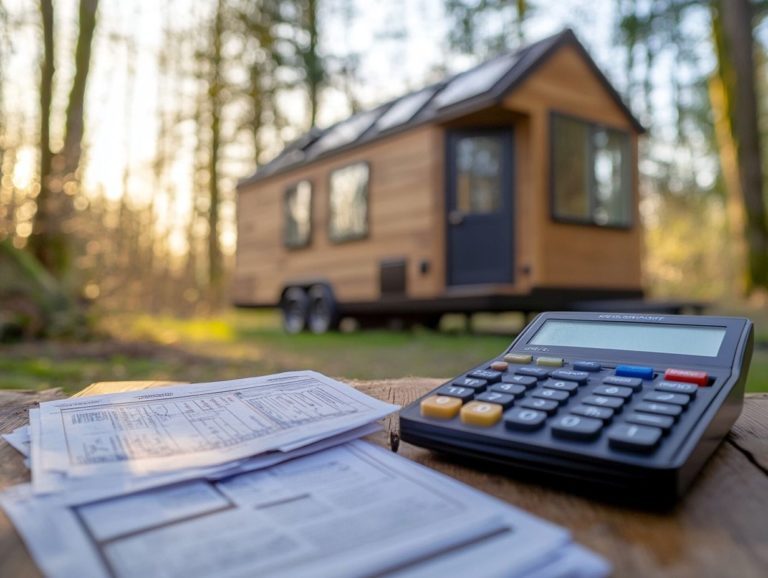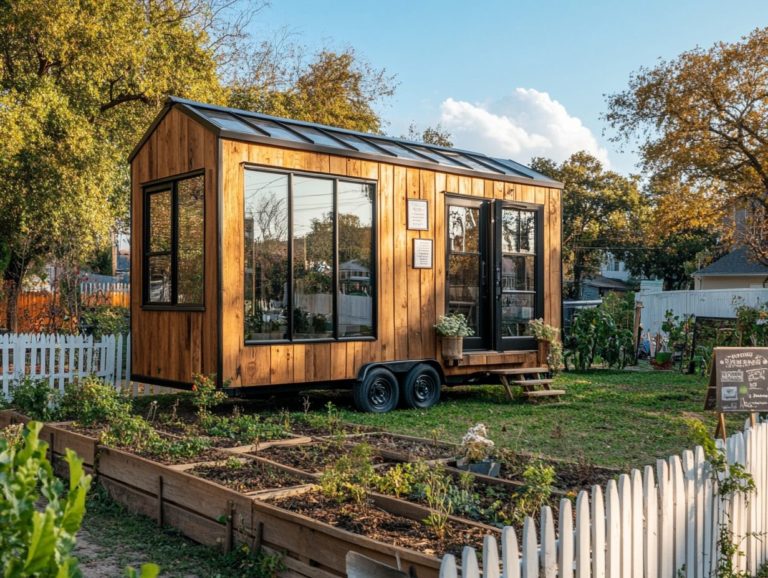Tiny House Construction: Key Legal Considerations
The tiny house movement has captivated countless individuals. It presents a simplistic yet deeply fulfilling lifestyle that emphasizes tiny homes and their benefits.
Navigating the laws that apply to tiny house construction can feel overwhelming. You ll need to understand zoning regulations, obtain the right tiny house permits, choose the perfect location, and budget wisely. There s certainly a lot on your plate.
Get ready to explore the key legal considerations, design principles, and practical tips for maintaining your tiny home while ensuring compliance codes are met with all necessary regulations. Don t miss out on your chance to live your tiny home dream!
Contents [hide]
- Key Takeaways:
- Legal Considerations for Tiny House Construction
- Choosing the Right Location for Your Tiny House
- Building and Designing Your Tiny House
- Costs and Financing for Tiny House Construction
- Maintaining and Living in a Tiny House
- Frequently Asked Questions
- What are some key legal considerations when constructing a tiny house?
- Do I need to follow building codes when constructing a tiny house?
- Can I park my tiny house on any land?
- Do I need a permit to build a tiny house?
- Can I legally live in a tiny house under current regulations?
- What should I do if I face legal issues with my tiny house construction?
Key Takeaways:
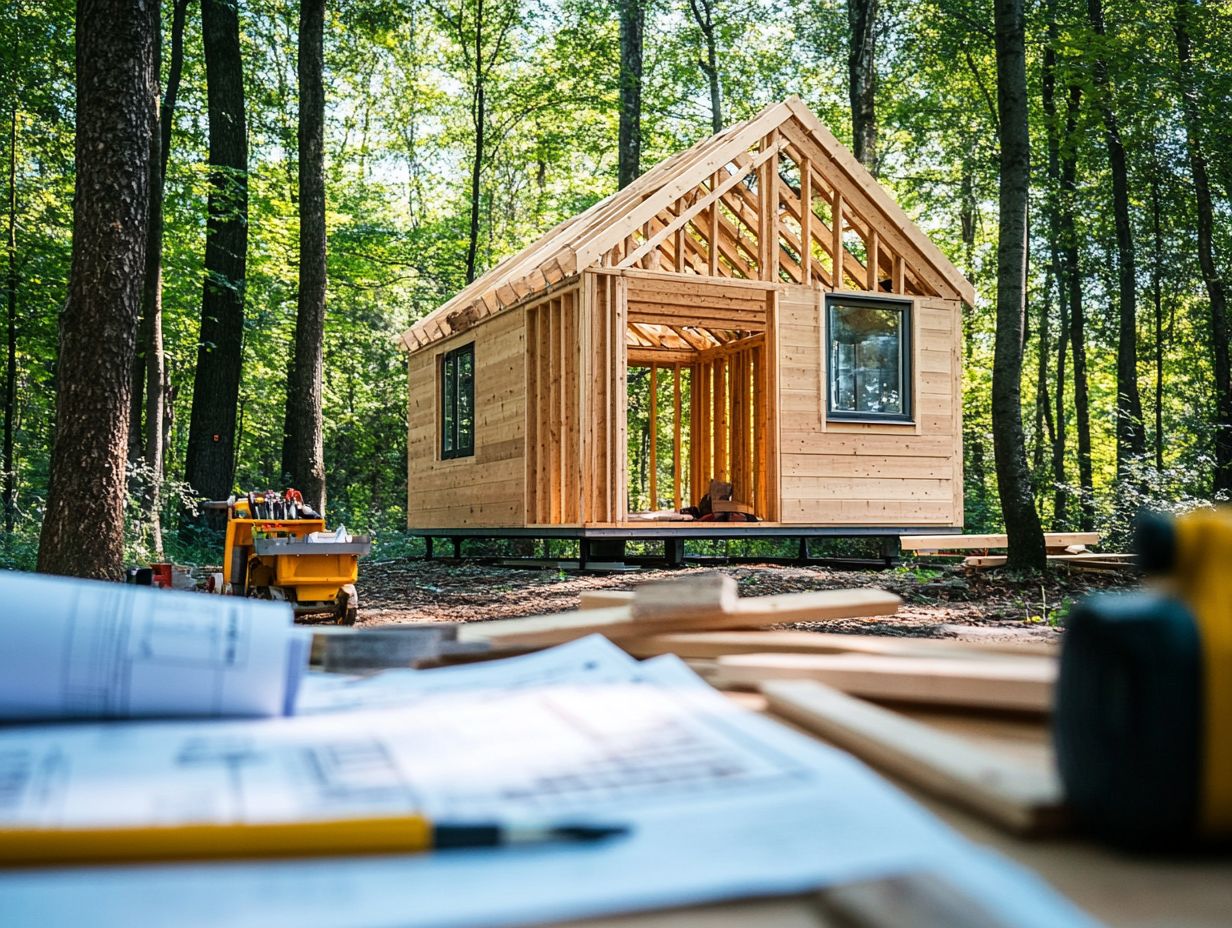
Understanding zoning regulations and building codes is crucial for legally constructing a tiny house.
Choosing the right location for your tiny house involves considering factors like access to utilities and local tiny house regulations.
Proper budgeting and financing options can help make your tiny house dream a reality, especially when navigating tiny house challenges.
What is a Tiny House?
A tiny house is more than just a compact living space; it s a declaration of simplicity, sustainability, and a minimalist lifestyle. You might have noticed the tiny house movement gaining momentum over the past decade. It champions the idea of living with less and embracing a more eco-friendly way of life.
These homes typically range from 100 to 400 square feet and can be mobile or stationary. This appeals to your desire for freedom and flexibility in how you live.
This shift toward smaller living isn t solely about downsizing; it s about elevating your quality of life while minimizing your ecological footprint. Many tiny house enthusiasts, like yourself, consciously choose a more intentional way of living, reducing clutter and focusing on what truly matters rather than accumulating material possessions.
If you opt for a mobile tiny house, you can take your home on the road, embracing adventure and exploration at every turn. On the other hand, stationary options often foster a sense of community and a deeper connection to your surroundings.
By adopting a sustainable lifestyle through efficient resource use and eco-friendly practices, you contribute significantly to the vital conversation around waste reduction and conservation efforts.
Legal Considerations for Tiny House Construction
When you’re contemplating the construction of a tiny house, it’s vital to understand the laws that apply to this endeavor. Zoning regulations and building codes can differ significantly from one municipality to another.
Understanding the nuances of tiny house laws is essential to steer clear of potential conflicts with homeowners associations. It ensures you remain in compliance with local regulations. This is particularly important when deciding whether your tiny home will be classified as a recreational vehicle or as an accessory dwelling unit (ADU). For a comprehensive overview, refer to tiny house regulations: a state-by-state guide, which details important distinctions and requirements.
Zoning and Building Codes
Zoning regulations and building codes are crucial for placing a tiny house in your desired area. They dictate where and how these homes can be constructed and occupied to comply with local regulations.
Local zoning laws might limit tiny houses to specific communities or designated land-use categories. Meanwhile, building codes lay out requirements for things like minimum ceiling height and emergency exits to ensure your safety and comfort. For those navigating these regulations, finding tiny house legal assistance can be invaluable.
In states such as California, you might encounter stringent regulations that cover everything from utilities to environmental impact. These require permits that align with local community standards. On the flip side, Florida offers a more relaxed approach in certain regions, providing you with greater flexibility in establishing tiny home villages.
Every state has its own building codes that elaborate further on safety measures for tiny houses. These detail requirements for structural integrity, insulation, and fire safety, which can vary widely. Navigating these differing regulations is essential for anyone looking to embrace tiny house living, so it’s important to understand tiny house occupancy permits to ensure compliance while cultivating a vibrant sense of community.
Permits and Inspections
Obtaining the necessary permits and passing building inspections are essential steps in your tiny house construction journey. These steps ensure that your home aligns with local building rules and regulations.
Keep in mind that each municipality may have its own unique requirements for tiny house permits. These can include documentation for construction plans, inspections for plumbing necessities, and adherence to safety standards. Additionally, it’s important to be aware of tiny house HOA rules that may affect your living situation.
Understanding these local regulations is crucial. It helps you sidestep potential legal pitfalls during or after construction. Typically, your process will start with a thorough exploration of local land rules to see whether placing a tiny home on your desired plot is feasible. For more detailed insights, consider reading about tiny house living and the importance of zoning. Once you’ve confirmed this, the next step is to submit an application along with all the required paperwork.
As construction progresses, you can expect inspections at various stages. For example, your electrical and plumbing systems will likely need a thorough examination to ensure safety and compliance. Following these guidelines not only cultivates a sense of community support but also boosts the overall acceptance of tiny houses within neighborhoods.
Land Ownership and Leasing
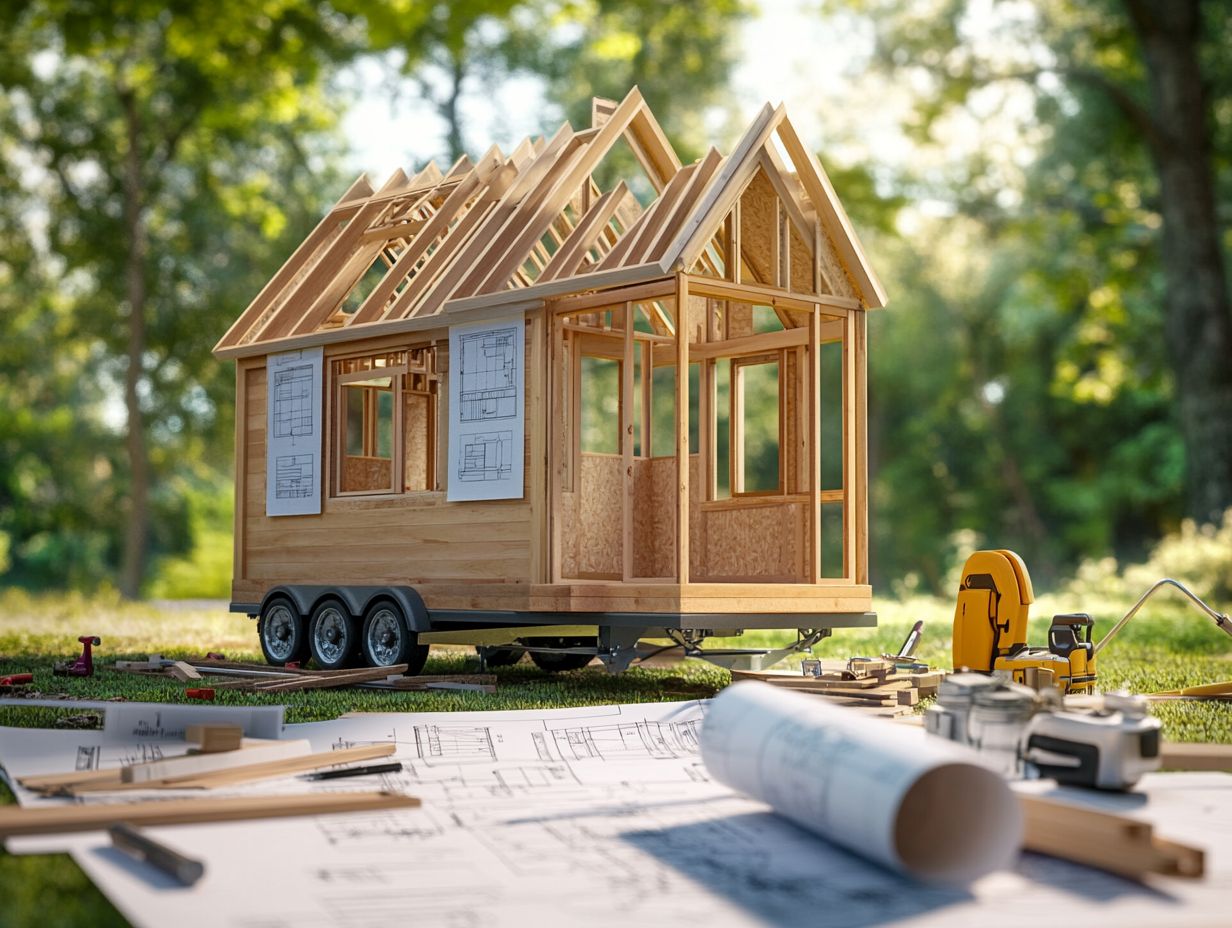
Navigating land ownership and leasing options is essential for you as a tiny house enthusiast. Land use restrictions can significantly impact where you can legally place your tiny home.
You ll love exploring tiny house communities that offer shared resources and a supportive atmosphere. However, some may encounter challenges in securing land due to homeowners associations or restrictive local zoning laws.
Each option presents its own set of benefits and drawbacks:
- Buying Land: You gain complete ownership and the freedom to develop your property as you wish, allowing for personal gardens or distinctive design features. However, this path often requires a substantial initial investment and ongoing property taxes that could strain your budget.
- Leasing Land: This option may provide the flexibility and lower upfront costs you seek, typically with less responsibility for maintenance. Yet, it often comes with limitations imposed by landlords.
In tiny house communities, you can enjoy shared amenities, but those come with strict regulations from homeowners associations. These rules may sometimes conflict with the principles of minimalistic living that you cherish.
Choosing the Right Location for Your Tiny House
Choosing the right spot for your tiny house is exciting and vital! You need to consider zoning laws, land-use restrictions, and the presence of welcoming tiny house communities.
Also, consider how close you are to essential services, environmental factors, and the level of community support. These elements should significantly influence your decision-making process, ensuring you find a space that provides both comfort and compliance.
Factors to Consider
When selecting the ideal location for your tiny home, several factors come into play. You’ll want to consider the environmental impact of your living situation and the level of community support in the area.
It’s essential to understand local land use restrictions, access to amenities, and the cultural acceptance of the tiny house lifestyle. This understanding ensures a harmonious living experience.
Equally important is how your chosen site connects with local resources, such as water and energy sources. These connections can significantly enhance the sustainability of tiny home living.
Being close to community gardens, recycling programs, and public transportation can help you cultivate a more environmentally conscious lifestyle. This perfectly aligns with the principles of minimalism and ecological responsibility.
Engaging in local events and building relationships with your neighbors can further enrich your unique living experience within the tiny house community. It s not just about the physical space; it s about creating a supportive network that values sustainable practices and shared resources.
Now is the time to research local laws or visit a tiny house community to truly immerse yourself in this exciting lifestyle!
Building and Designing Your Tiny House
When you embark on the journey of building and designing your tiny house, carefully consider elements that maximize space and ensure compliance with building codes. This approach promotes a sustainable lifestyle.
Key design features should include furniture that serves multiple purposes, energy-efficient appliances, and innovative storage solutions. These elements should be meticulously crafted to meet the unique demands of tiny home living.
Key Design Elements
Key design elements in tiny house construction focus on maximizing functionality while minimizing environmental impact. Multifunctional furniture and efficient plumbing solutions play starring roles. Thoughtful choices, such as using stairs and ladders to access loft spaces, can elevate the usability of your limited square footage.
Incorporating creative and practical storage solutions can transform even the tiniest corners into organized havens. Embracing sustainable practices, like utilizing reclaimed materials, decreases your carbon footprint and champions a lifestyle that values environmental stewardship.
Ensuring compliance with local plumbing codes and safety standards is crucial. Adhering to international residential code guidelines makes certain your tiny house is livable, safe, and reliable. Additionally, having access to tiny house legal resources can provide invaluable support. Effective space management strategies, such as open floor plans and strategic lighting, enhance spaciousness, turning your tiny home experience into something functional and enjoyable.
Costs and Financing for Tiny House Construction
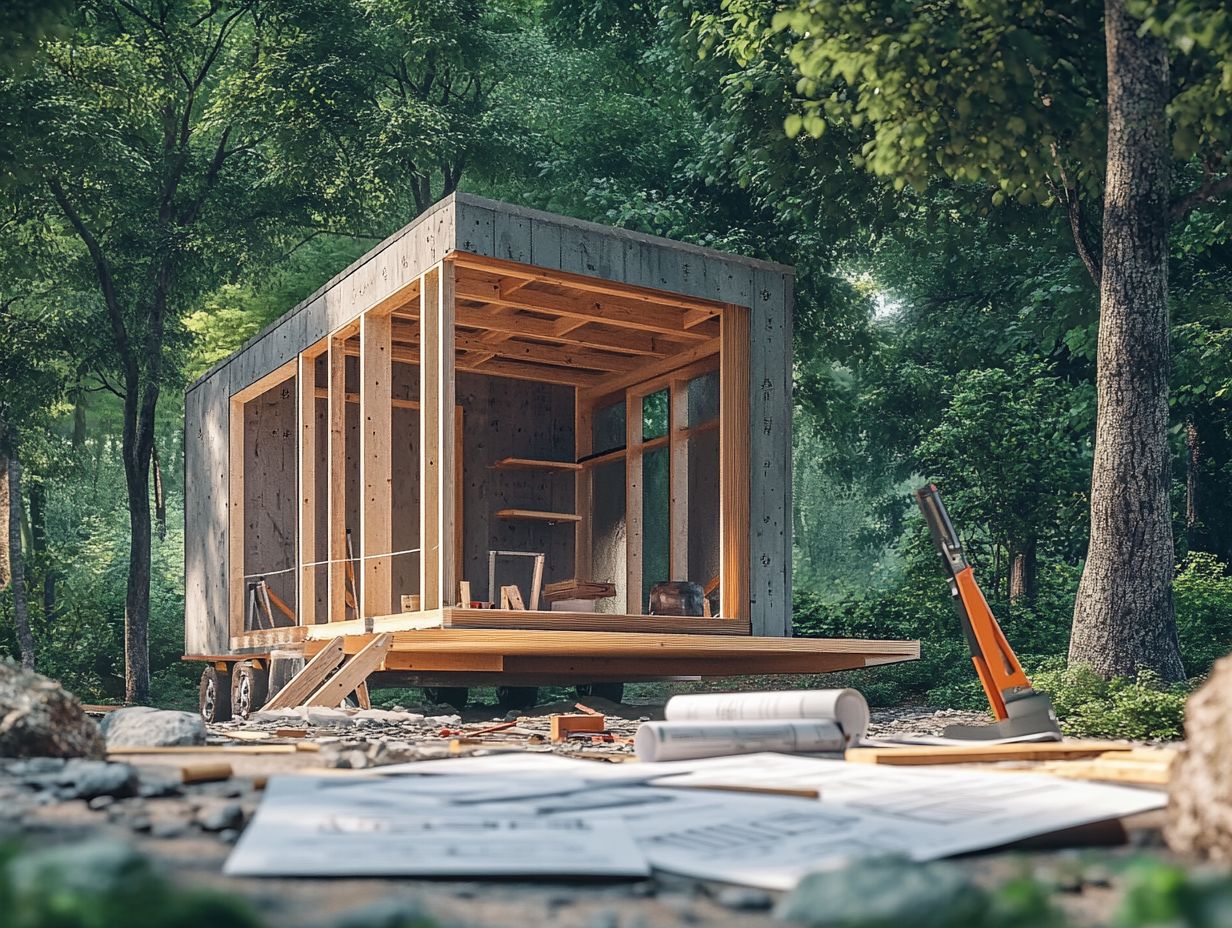
Knowing your costs and financing options for tiny house construction can make your tiny house dream a reality! Expenses can fluctuate significantly based on design, materials, and location.
Careful budgeting is essential to maintain a sustainable lifestyle while aligning with your financial goals. You might discover a range of alternative financing options, including loans uniquely suited for tiny homes. These options can help you navigate this exciting journey with confidence.
Budgeting and Financing Options
Budgeting for a tiny house demands a keen understanding of both upfront costs and ongoing expenses. This is particularly important when considering options for recreational vehicles or mobile homes, as various financing options can significantly shape your overall investment.
Explore loans specifically tailored for tiny house purchases and alternative avenues like personal savings and crowdfunding to make tiny home living a reality. Additionally, it’s crucial to understand the legalities of tiny house construction to ensure a smooth process.
Planning ahead is vital. As a potential tiny house owner, consider factors like land acquisition, utility connections, and ongoing maintenance costs. Utilizing financial tools, such as budgeting apps, can be a game changer. They allow you to track monthly expenses and allocate your funds wisely. Don’t forget to account for insurance costs, property taxes, and possible homeowners’ association fees. Additionally, being informed about tiny house zoning laws is crucial for a successful move.
By meticulously analyzing these elements, you can craft a sustainable financial plan that meets your immediate needs and supports a long-term, minimalist lifestyle. This approach frees you from the weight of financial burdens and aligns with the values of off-grid living.
Maintaining and Living in a Tiny House
Living in a tiny house means embracing sustainability and efficiency. This way, you can enjoy the joys of a minimalist lifestyle while staying comfortable.
By prioritizing community support and responsible resource management, you can significantly enhance your tiny home living experience. Participate in various advocacy groups that promote tiny house friendly policies. Additionally, it’s important to be aware of tiny house laws that every owner should know. This engagement helps thoughtfully address any potential environmental impacts.
Tips for Maintenance and Sustainable Living
Effective maintenance and sustainable living practices are crucial for tiny home residents. These practices help you prolong your investment and enhance your quality of life.
By regularly inspecting your tiny dwelling, you can spot potential issues early. This proactive approach saves time and maintains the integrity of your unique space.
Focus on energy-efficient practices. Using solar panels or high-efficiency appliances reduces utility costs and minimizes your environmental footprint.
Engage with local community initiatives related to the Tiny House Movement. Building connections with neighbors fosters a supportive network and enhances your living experience.
Frequently Asked Questions
What are some key legal considerations when constructing a tiny house?
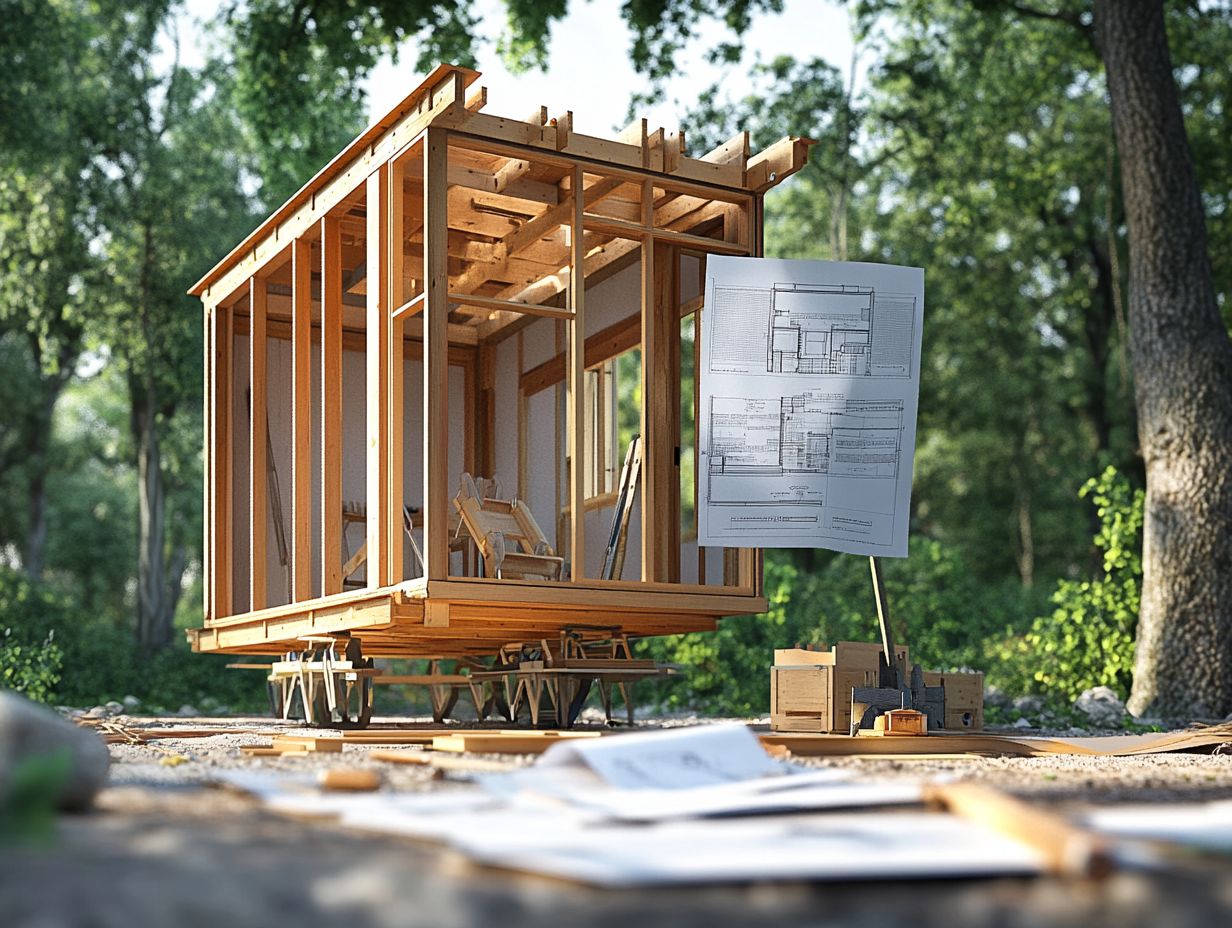
Consider zoning and building codes, permits, and land use restrictions before you start building.
Do I need to follow building codes when constructing a tiny house?
Yes, following building codes ensures the safety and structural integrity of your home.
Can I park my tiny house on any land?
No, researching land use restrictions and zoning laws is vital before parking or building your tiny house.
Do I need a permit to build a tiny house?
In most cases, yes. Check with local building authorities for specific requirements.
Can I legally live in a tiny house under current regulations?
This varies by area. Some zones allow tiny houses as permanent residences, while others do not.
What should I do if I face legal issues with my tiny house construction?
Seek legal counsel from a lawyer specialized in zoning and land use regulations. They can protect your rights effectively.

